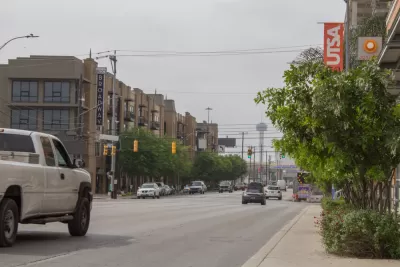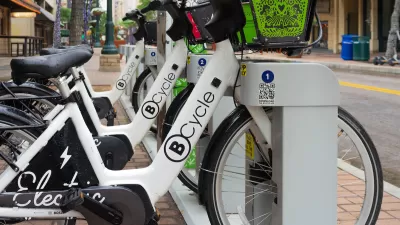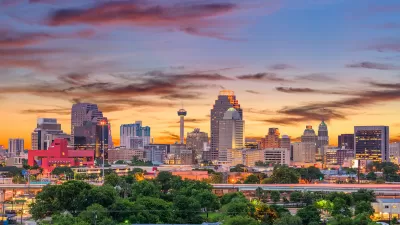The agency argues that the city cannot introduce lane reductions on a state road, putting a long-planned bike lane project in jeopardy and superseding local decisionmaking.

Bike advocates often face an uphill battle in their efforts to build safer bike infrastructure in their cities. But even well-meaning local efforts to improve road conditions for people on bikes can be thwarted by state agencies. This is the case with San Antonio, as reported by Jared Brey in Governing.
“Like a lot of other big cities, San Antonio has tried to make some of its streets safer for bikers and pedestrians. In 2017, voters approved a bond measure to fund a range of public-realm improvements, including 200 miles of new sidewalks.” One project funded by this bond, a two-mile redesign of Broadway that would have added bike lanes, was nixed by the Texas Department of Transportation, who claimed that, as a state route, the road could not be narrowed from its six driving lanes, despite having worked with the city on the project for years.
“The moves are in keeping with state leaders’ focus on reducing traffic congestion on state roads, and part of a broader culture war over transportation” that Planetizen readers are undoubtedly familiar with (see examples here, here, here, and here, for starters). City planning professor Sara Bronin points to the inherent conservative nature of engineers, saying, “What we’re seeing in the traffic context is that the inclination to rely on established safety standards has resulted in complacency, and that has led to these standards not being questioned by the majority of decision-makers.”
For now, San Antonio policymakers are faced with a project in limbo until TxDOT agrees to a plan.
FULL STORY: Can San Antonio Become a Better Bike City? Not on State Roads.

Planetizen Federal Action Tracker
A weekly monitor of how Trump’s orders and actions are impacting planners and planning in America.

Map: Where Senate Republicans Want to Sell Your Public Lands
For public land advocates, the Senate Republicans’ proposal to sell millions of acres of public land in the West is “the biggest fight of their careers.”

Restaurant Patios Were a Pandemic Win — Why Were They so Hard to Keep?
Social distancing requirements and changes in travel patterns prompted cities to pilot new uses for street and sidewalk space. Then it got complicated.

Platform Pilsner: Vancouver Transit Agency Releases... a Beer?
TransLink will receive a portion of every sale of the four-pack.

Toronto Weighs Cheaper Transit, Parking Hikes for Major Events
Special event rates would take effect during large festivals, sports games and concerts to ‘discourage driving, manage congestion and free up space for transit.”

Berlin to Consider Car-Free Zone Larger Than Manhattan
The area bound by the 22-mile Ringbahn would still allow 12 uses of a private automobile per year per person, and several other exemptions.
Urban Design for Planners 1: Software Tools
This six-course series explores essential urban design concepts using open source software and equips planners with the tools they need to participate fully in the urban design process.
Planning for Universal Design
Learn the tools for implementing Universal Design in planning regulations.
Heyer Gruel & Associates PA
JM Goldson LLC
Custer County Colorado
City of Camden Redevelopment Agency
City of Astoria
Transportation Research & Education Center (TREC) at Portland State University
Camden Redevelopment Agency
City of Claremont
Municipality of Princeton (NJ)





























